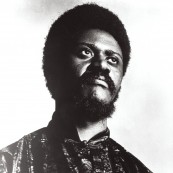Pharoah Sanders is an American jazz musician playing soprano and tenor saxophone in a very unique way. He was born Ferrell Sanders as the son of two music teachers on October 13, 1940 in Little Rock, Arkansas starting with his first instrument, the clarinet, but at high school changed to tenor. As a teenager he backed blues greats like Bobby Blue Bland and Junior Parker at clubs in his hometown. After high school Sanders moved to Oakland to study art and music, simultaneously playing be-bop, R&B and free jazz in clubs with fellow musicians like Dewey Redman, Sonny Simmons, Ed Kelly and Smiley Winters.
In 1961 he moved to the jazz-mecca New York, where after some ups and downs he played with Sun Ra (who christened him Pharoah instead of Ferrell), Don Cherry and Billy Higgins, which in ’63 gave him enough confidence to start his own group with John Hicks-p, Wilbur Ware-b and Billy Higgins-d. During a concert with the quartet at the Village Gate, he had an impressed John Coltrane in the audience. From ‘64, Coltrane started to invite Sanders to join his combo with the result of almost ten Coltrane albums featuring Sanders (check the 1965 album ‘Ascension’) which, of course, put him on the jazz map at large.
No wonder his first recording as a leader followed soon: “Pharoah’s first” in ’64 for ESP. After the untimely death of Coltrane in ‘67, Sanders briefly continues to work with his widow, harp player Alice Coltrane. Between ‘66 and ‘71 he recorded several albums for Impulse, while his most commercial album was recorded in ‘77 with guest vocalist Phyllis Hyman for Arista: ‘Love Will Find A Way’. The next ten years he recorded for the small labels Theresa, Evidence and the Dutch Timeless. The compilation Dopeness Galore has compiled are from the recordings made for Timeless: ‘Africa’ (1988), ‘Moonchild’ (1989) and ‘Welcome To Love’ (1990). Another giant step was made in his career by recording for Verve with producer Bill Laswell (in ‘95 and ‘98), who was able to capture the sound of Sanders on record as never before.
Especially his seventies and eighties recordings later became an important inspiration for the spiritual jazz movement, another invention of the most influential UK dj Gilles Peterson, who earlier invented acid jazz and rare groove. This illustrates the fact, that Sanders’ music is indeed timeless! Nowadays Sanders is regarded as one of the last remaining musical pioneers from the fertile New York jazz scene of the mid sixties. “He is a true originator with an unmistakable sound, playing jazz but also beyond jazz, always free to renew his music and surprise his admirers time and time again.”
Sjeng Stokking
Style: Jazz
Artist: Pharoah Sanders










